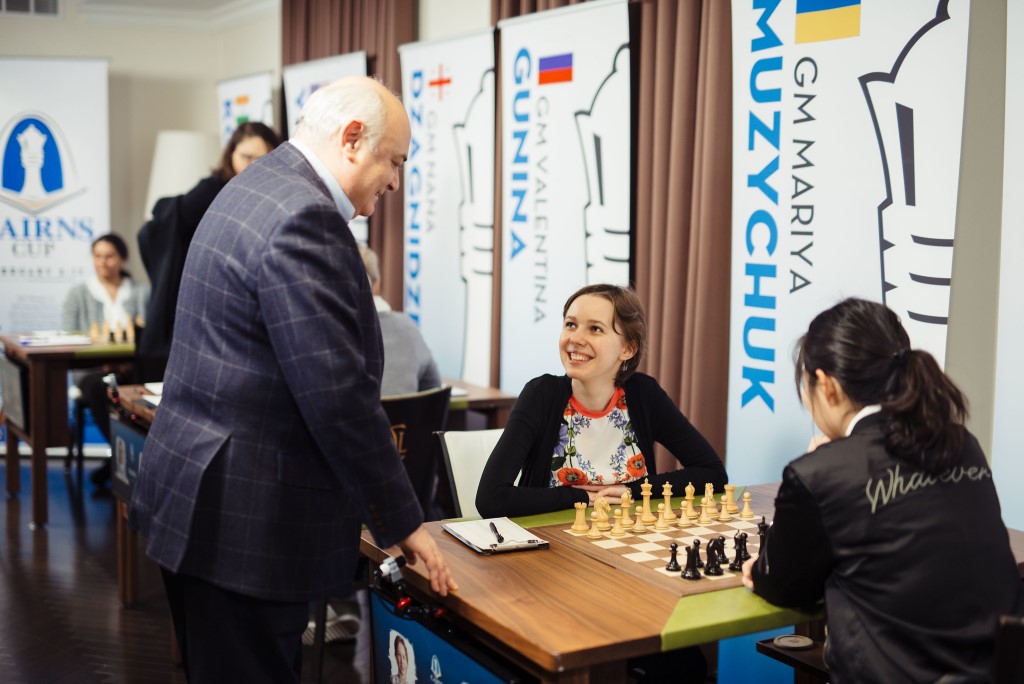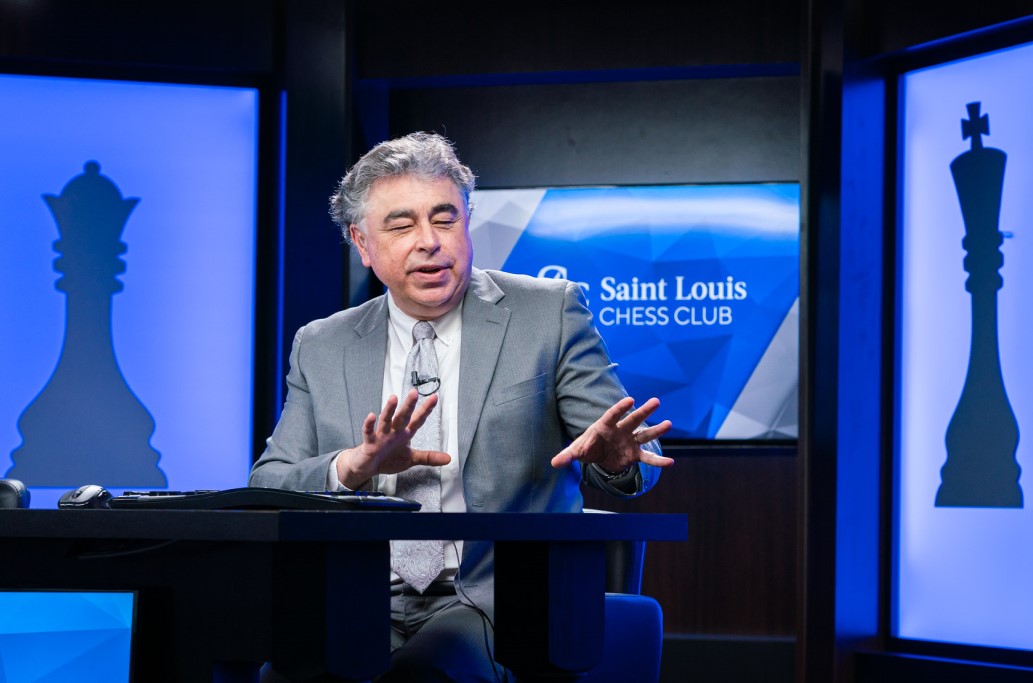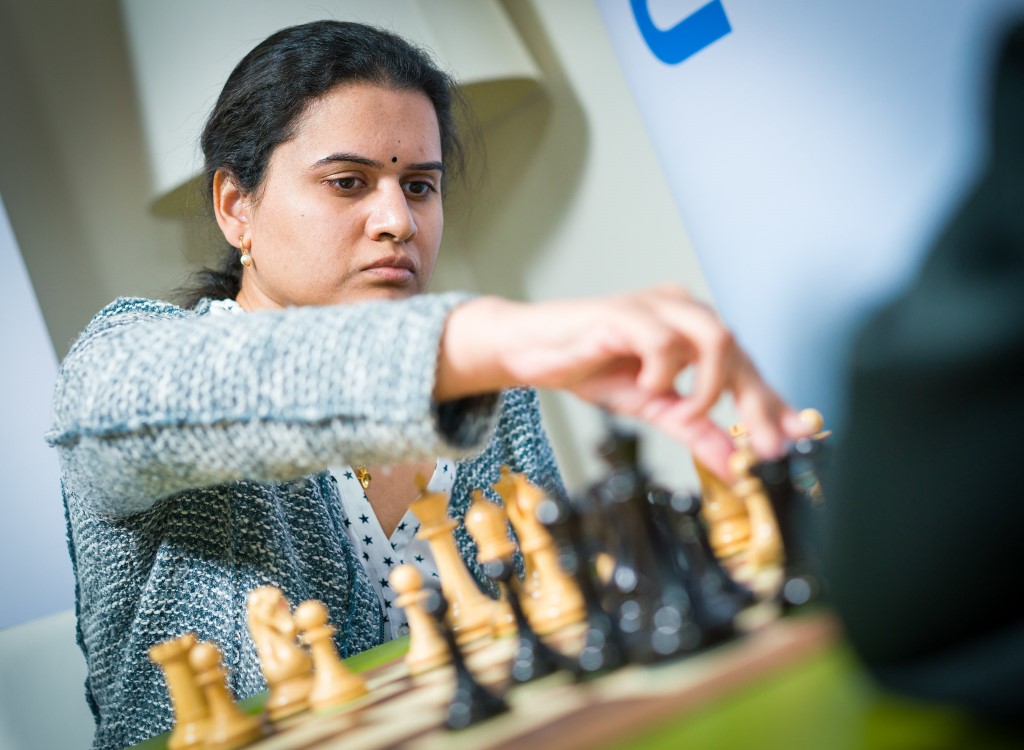


Chess News







ChessBase 17 - Mega package - Edition 2024
It is the program of choice for anyone who loves the game and wants to know more about it. Start your personal success story with ChessBase and enjoy the game even more.
Taking risks with the black pieces can easily lead a player astray, especially when facing experienced, technically strong opponents. That is precisely what happened to the youngest player in the field Carissa Yip and the ever-entertaining Valentina Gunina, as they risked a bit more than they should have and were convincingly outplayed by Humpy Koneru and Nana Dzagnidze. The top players from India and Georgia thus became the first shared leaders of the 2020 Cairns Cup.
Yip took a chance by using the King's Indian Defence against Humpy, one of the most principled players in the circuit. The Indian advanced her h-pawn all the way down to the sixth rank, further hindering her rival's ability to manoeuvre in a defence that already leaves Black with a considerable space disadvantage. On move 19, Yip missed a chance to free up her army:
Master Class Vol. 12: Viswanathan Anand
This DVD allows you to learn from the example of one of the best players in the history of chess and from the explanations of the authors how to successfully organise your games strategically, consequently how to keep your opponent permanently under press
The young American played 19...f6 here, underestimating the strength of Humpy's response — 20.♘e6. White goes for a positional pawn sacrifice, expecting to bank on the awful situation of Black's dark-squared bishop on h8, now completely boxed up by its own pawn structure (19...♝f6 was called for to activate the piece). The game continued 20...♞xe6 21.dxe6 ♝xe6 22.♗c4 ♞c7.
It must be noted that Yip's strategy did work in one regard, as Humpy spent way too much time trying to find a way to 'punish' Black's play, which left her pretty much playing on increment ten moves prior to the control. The 32-year-old from Vijayawada found the critical winning plan nevertheless:
White is still a pawn down, but is also putting strong pressure on the b-pawn — if that pawn disappears it is hard to imagine Black surviving with such a passive bishop. That is why Humpy needed to find 30.♗d2 here, planning to push the a-pawn up the board while allowing her rival to get a strong centre after 30...f5 31.a4 fxe4 (note that going for an immediate 30.a4 is not as good due to 30...♜a8). Five moves later, White had penetrated through the b-file, gained the hapless bishop and forced her opponent's resignation.
This victory left Humpy as world number two in the live ratings, barely edging world champion Ju Wenjun but still over 80 points behind semi-inactive Hou Yifan.

Current world rapid champion Humpy Koneru | Photo: Lennart Ootes
Valentina Gunina also started off on the wrong foot. The tactical fighter won the first edition of the event with an extraordinary 7 out of 9 score. She, however, comes from having a subpar performance in Gibraltar and will need to find her groove in Saint Louis if she wants to fight for first again. She is surely capable of doing just that, as almost every single one of her games features chaotic struggles.
Against Nana Dzagnidze, Gunina played a strange-looking 9...♛d6 out of a Trompowsky attack. Dzagnidze noticed this questionable plan gave her chances to go for the win and carefully executed a sequence that left her a pawn to the good in the early middlegame:
Trompowsky for the attacking player
Tap into your creative mind and start the game on a fresh note. The Trompowsky (1.d4 Nf6 2.Bg5) is an opening outside of conventional wisdom. Create challenges and make your opponent solve problems early on.
Georgia's number one spent 17 minutes on 13.a4, the best way to profit from Black's uncoordinated army. There followed 13...♛b8 14.axb5 axb5 15.♗xh7 and it only remained to be seen whether White would find the right path to convert her advantage.
Dzagnidze later declared that she was happy with her play and that she never felt she had lost the thread. Nevertheless, while two pawns up in what seemed to be a completely winning position for White, Gunina missed a golden chance to save a half point:
Here Dzagnidze faltered by playing 31.♔g2 instead of 31.♔h1. The idea is that after 31...♛h3+ 32.♔h1 Black can draw with the precise 32...♚f6, planning to hide on g7 if White gives a check, while also threatening to play ...♜h8 next. In this case, all White can get is a perpetual.
Of course, we cannot blame Gunina for not finding 32...♚f6 in her calculations with the time control approaching dangerously and after having defended a miserable position for quite a while. Dzagnidze did not need much longer to secure the victory.

Defending champion Valentina Gunina | Photo: Lennart Ootes
The first game to finish was the draw between Mariya Muzychuk, with White, and Ju Wenjun. It was a Petroff Defence in which Muzychuk could have pushed for more at some point. Meanwhile, Kateryna Lagno was outprepared in the opening by Harika Dronavalli. Lagno, playing White, met the challenge of finding solutions over the board, albeit in exchange of a heavy investment of time on her clock. On move 36, the Russian did not have enough time to calculate a variation that would have given her chances to fight for the full point:
The Accelerated Dragon - a sharp weapon against 1.e4
After 1.e4 c5 2.Nf3 Nc6 3.d4 cxd4 4.Nxd4 g6! leads to the so-called "Accelerated Dragon Defense". On this DVD the Russian grandmaster and top women player Nadezhda Kosintseva reveals the secrets of her favourite opening.
Lagno played 36.♗d6 and the draw was signed after 36...♜e3 37.♖xd5. The direct 36.♖xd5 was playable though, as White should not be afraid of the variation 36...♜e1+ 37.♔g2 ♞f4+ 38.♔f2 ♜e2+ 39.♔f1 ♜c2 as she can consolidate with 40.♖d8+ ♚f7 41.♗d4. Easier said than done.
Finally, the last encounter to finish was Alexandra Kosteniuk versus Irina Krush. The latter got some chances against White's isolated queen's pawn, but there were always enough dynamic resources for the former world champion to keep the balance.
Click or tap to select a game from the list

Harika Dronavalli and Kateryna Lagno discussing their round one game | Photo: Austin Fuller
The Reti, a flexible attacking opening
The Nimzo-Indian, the Gruenfeld and the King's Indian Defence are three incredibly uncomfortable defences to meet. This hypermodern DVD gives new ideas on how to squash these setups with sound, positional play based on double fianchetto systems.
Commentary by WGM Jennifer Shahade, GM Yasser Seirawan and GM Alejandro Ramirez
Links